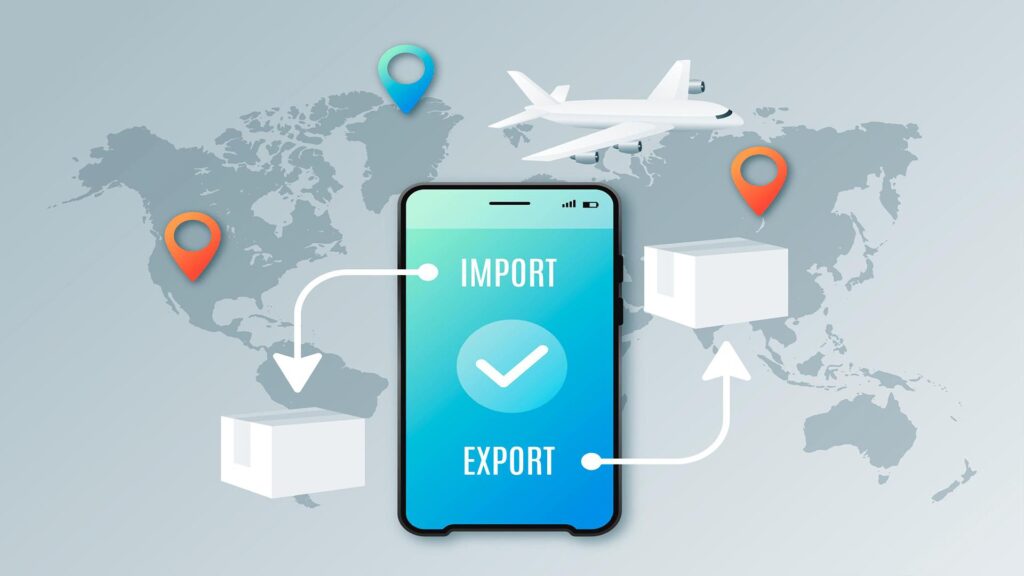What benefits does a digital supply chain offer to businesses? The modern business landscape is undergoing a seismic transformation driven by the relentless march of technology. In this digital age, the traditional supply chain is rapidly evolving into what we now call the “Digital Supply Chain.” This revolutionary concept is reshaping industries, optimizing operations, and redefining the way we do business.
Defining the Digital Supply Chain

What is a digital supply chain? The Digital Supply Chain, at its core, is a connected ecosystem that leverages cutting-edge technology to enhance visibility, efficiency, and agility across the entire supply chain process. It integrates various digital tools and technologies, such as the Internet of Things (IoT), blockchain, artificial intelligence (AI), big data analytics, and cloud computing, to create a seamless, data-driven network.
The Digital Advantage

What benefits does digital logistics offer to businesses? Let us have a look at it:
1. Enhanced Visibility:
Traditional supply chains often suffer from a lack of real-time visibility. The digital supply chain, however, provides end-to-end visibility, enabling stakeholders to track products, monitor performance, and predict disruptions in real time. For example, IoT sensors can provide real-time data on the location and condition of goods in transit.
2. Data-Driven Decision-Making:
In digital logistics, data is king. Advanced analytics and AI algorithms analyze vast amounts of data to uncover valuable insights. These in
sights empower businesses to make informed decisions, optimize routes, reduce waste, and predict demand accurately.
3. Improved Efficiency:
Automation is a cornerstone of the digital supply chain. Routine tasks are automated, reducing human error and accelerating processes. This allows employees to focus on more strategic tasks, leading to increased productivity.
4. Enhanced Collaboration:
Digital logistics fosters collaboration among stakeholders. Cloud-based platforms enable seamless communication and information sharing among suppliers, manufacturers, logistics providers, and customers.
5. Resilience and Adaptability:
In an era marked by frequent disruptions, a digital supply chain is better equipped to adapt. Real-time data allows for rapid adjustments to changing circumstances, such as supply shortages, demand fluctuations, or unforeseen events like the COVID-19 pandemic.
Use Cases in Action

Let’s take a look at how Digital Logistics is making waves in various industries:
Retail:
Retailers are using digital supply chain solutions to optimize inventory management. AI algorithms predict demand, ensuring that products are in stock when customers want them. IoT devices track items in stores, reducing theft and ensuring accurate stock levels.
Pharmaceuticals:
In the pharmaceutical industry, the Digital Supply Chain plays a crucial role in ensuring the integrity of products. IoT sensors monitor temperature and humidity during transportation, guaranteeing that medicines and vaccines remain effective.
Manufacturing:
Manufacturers are using digital twins – virtual replicas of physical assets – to simulate and optimize production processes. This results in reduced downtime, increased efficiency, and higher product quality.
Agriculture:
Smart agriculture leverages the Digital Supply Chain to monitor crop conditions, optimize irrigation, and manage logistics for perishable goods. This helps farmers increase yields and reduce waste.
Automotive:
Automotive companies are using digital logistics solutions to track the movement of parts across the globe. This visibility reduces lead times, lowers inventory costs, and improves production efficiency.
Challenges in Digital Supply Chain Implementation

While Digital Logistics offers tremendous advantages, it also presents challenges. Businesses must navigate data privacy concerns, cybersecurity threats, and the need for new skill sets among their workforce. Additionally, the upfront investment in technology and the complexity of integrating various systems can be barriers to adoption.
Integration Complexity:
Embracing digital technologies in the supply chain often leads to complexities in seamlessly integrating multiple systems and platforms. Legacy systems and compatibility issues might hinder a smooth transition.
Data Security and Privacy:
With the influx of digital data, ensuring its security and maintaining customer privacy becomes a significant challenge. The threat of cyber-attacks and the need for regulatory compliance add to these concerns.
Change Management and Workforce Training:
Transforming to a digital environment necessitates a significant shift in the working culture. Resistance to change and the need for adequate training for existing staff members are significant challenges.
Lack of Standardization and Interoperability:
Different software and technologies might not integrate seamlessly due to a lack of common standards, leading to difficulties in exchanging information between systems.
Cost and Return on Investment (ROI):
The initial investment in digital transformation could be substantial. Establishing a clear ROI and ensuring the benefits outweigh the costs is a significant consideration.
Considerations for Successful Implementation

1. Strategic Planning:
A robust strategy outlining objectives and methods for a gradual shift to digitalization is vital for success.
2. Collaboration and Partnerships:
Building collaborations with tech partners, suppliers, and stakeholders is crucial. It encourages knowledge sharing and innovation in solving common challenges.
3. Robust Security Measures:
Implementing robust security protocols and constant risk management is essential to shield against potential data breaches and cyber threats.
Conclusion
In conclusion, the Digital Supply Chain is not the future; it’s the present. It’s a dynamic and evolving concept that has the potential to revolutionize businesses across sectors. From enhanced visibility and data-driven decision-making to improved efficiency and resilience, the advantages are clear. The question is not whether to embrace digital logistics but how fast and effectively companies can do so to secure their future in an increasingly digital world.
At Galaxy Freight, we understand the power of digital supply chains. We integrate the latest technologies into our supply chain solutions to ensure that our clients benefit from enhanced efficiency, visibility, and resilience. Leveraging our expertise and innovation, we help businesses streamline their operations, reduce costs, and adapt to the dynamic demands of the digital age.
Ready to embark on a journey toward a more efficient, data-driven supply chain? Contact Galaxy Freight today to explore how our digital supply chain solutions can transform your business and drive success in today’s rapidly evolving marketplace. Let’s navigate the digital landscape together and lead your business to greater heights of operational excellence.



